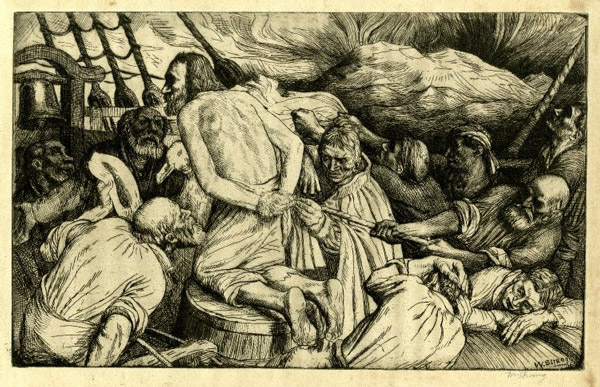A Brief Summary of the Poem The Rime of the Ancient Mariner
Introduction
The Rime of the Ancient Mariner has a close parallel to the Biblical story of Abel and Cain, the two sons of Adam and Eve. Adam minded the sheep while Cain was a tiller of the ground. In course of time, Cain brought to the Lord an offering of the fruits of the ground while Abel offered Him the fat portions of his sheep. The Lord accepted Abel's gifts but not that of Cain. In a fit of jealousy and anger, Cain killed Abel and thus became the first murder on earth. The Lord cursed Cain and, "You should be a fugitive and a wanderer on the earth". He put a mark on Cain to warn other men to stay away from him.
The Rime of the Ancient Mariner is a similar story about an old sailor who during a sea voyage thoughtlessly kills an albatross(a large seabird). He is punished for his cruel, wanton act and experiences extreme physical hardship and alienation from expiation, he is cursed to wander from country to country and narrate his story and thereby relive those horrible moments.
Thus the two stories deal with crime, punishment, penance and some kind of redemption(forgiveness). It is interesting to learn from contemporary evidence that Coleridge was keenly interested in the subject of guilt, suffering, and expiation. He began writing a poem called "The Wandering of Cain" and although he did not complete it, he modelled his Mariner on the figure of Cain and explored the theme of psychology of guilt in this poem.
The Rime of the Ancient Mariner Summary
An old sailor (the Ancient Mariner) detains a guest at a wedding to tell him the story of his strange voyage. The guest eager to join the festivities protest but the Mariner with the force of his personality compels him to sit and listen. The voyage begins normally and the ship sails southwards till it reaches the Equator. It is then driven by a storm to the regions of perpetual ice. There is no sign of life there till a large seabird, the albatross appears. This coincides with the coming of a favourable wind and the ship returns northwards. The bird is welcomed by the ship's crew who feed it and enjoy its company. It follows the ship for nine days when all of a sudden without any apparent cause the Mariner shoots the bird.
Part II
The ship moves northwards but the foggy conditions of the polar regions persist. The Mariner's shipmates blame him for killing the bird of good omen that made the breeze to blow. When, however, they approach the equatorial regions and the fog clears and the sun shines brightly, they applaud the Mariner's deed of killing the bird as though it had brought the fog. They thus become accomplices in the Mariner's crime. At the equator, the ship is stranded without a breeze and the crew suffers terribly from heat and thirst. This marks the beginning of the punishment for the killing of the albatross. The shipmates now blame the Mariner for their suffering and they hang the dead bird around the Mariner's neck as a sign of his guilt.
Part III
The ship remains stationary and the torture of the crew continues. They are visited by a horrifying skeleton ship manned by two fearsome figures. One is identified as Death and the other as Life-in-Death. They gamble for the lives of the crew: Death wins all of them except the Mariner whom Life-in-Death takes possession alive to be left alone with his torment.
PartIV-VII
The Mariner suffers total isolation and he is plagued by a sense of guilt. The only living things visible are the sea-creatures which look ugly to him as they crawl about. He is surrounded by the bodies of his shipmates whose eyes seem to curse him even in their death. This agony continues for seven days when under the light of the moon the Mariner observes a Hermit and asks him to listen to his confessional story. As he begins to narrate his experiences he is wrenched by a terrible agony which leaves him only when his story is finished. This compulsion to roam from land to land and narrate his story (and relive his experience) is the penance that he must do all through his life.
Sounds from the wedding celebration are heard and as the wedding guest gets ready to leave, the Mariner tells him that his greatest joy in life is to be a part of the human community once again. The Mariner teaches by his own example that as part of God's creation we must love and revere all things that God has made. The poem ends with the departure of the Mariner and the wedding guest finds himself 'a sadder and a wiser man' after this strange encounter with the Mariner.
Source: Understanding Poetry, Indira Gandhi National Open University School of Humanities


ConversionConversion EmoticonEmoticon